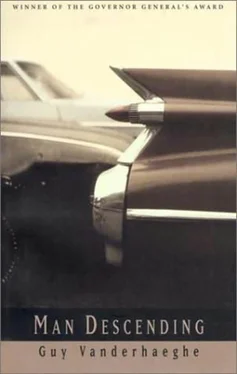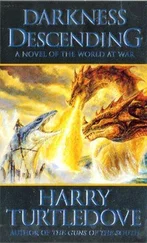“That’s what all the criminals say.” He opened the door. “Entrez-vous.”
I was getting my old crazy feeling really bad. Really bad. I felt kind of dizzy. “I got this thing,” I said, “about being locked up. It’s torture.”
“Get in.”
“No – please,” I said. “I’ll sit upstairs. I won’t bother anybody.”
“You think you’ve got a choice? You don’t have a choice. Move your ass.”
I was getting ready to cry. I could feel it. I was going to bawl in front of a cop. “I didn’t do it,” I said. “I never beat him up. Swear to Jesus I didn’t.”
“I’m counting three,” he said, “and then I’m applying the boots to your backside.”
It all came out. Just like that. “ It was my fucking ass-hole brother Gene !” I screamed. The only thing I could think of was, if they put me in there I’ll be off my head by morning. I really will. “I didn’t do nothing! I never do nothing! You can’t put me in there for him!”
They called my old man. I guess I gave a real convincing performance. Not that I’m proud of it. I actually got sick on the spot from nerves. I just couldn’t hold it down.
Pop had to sign for me and promise to bring Gene down in the morning. It was about twelve-thirty when everything got cleared up. He’d missed his shift and his ride in the cage.
When we got in the car he didn’t start it. We just sat there with the windows rolled down. It was a beautiful night and there were lots of stars swimming in the sky. This town is small enough that street-lights and neon don’t interfere with the stars. It’s the only thing I like about this place. There’s plenty of sky and lots of air to breathe.
“Your brother wasn’t enough,” he said. “You I trusted.”
“I only tried to help him.”
“You goddamn snitch.” He needed somebody to take it out on, so he belted me. Right on the snout with the back of his hand. It started to bleed. I didn’t try to stop it. I just let it drip on those goddamn furry seat-covers that he thinks are the cat’s ass. “They were going to put me in this place, this cage, for him, for that useless shit!” I yelled. I’d started to cry. “No more, Pop. He failed! He failed on top of it all! So is he going to work? You got the boots ready on the back step? Huh? Is he going down in the fucking cage?”
“Neither one of you is going down in the cage. Not him, not you,” he said.
“Nah, I didn’t think so,” I said, finally wiping at my face with the back of my hand. “I didn’t think so.”
“I don’t have to answer to you,” he said. “You just can’t get inside his head. You were always the smart one. I didn’t have to worry about you. You always knew what to do. But Gene…” He pressed his forehead against the steering-wheel, hard. “Billy, I see him doing all sorts of stuff. Stuff you can’t imagine. I see it until it makes me sick.” He looked at me. His face was yellow under the street-light, yellow like a lemon. “I try so hard with him. But he’s got no sense. He just does things. He could have killed that other boy. He wouldn’t even think of that, you know.” All of a sudden the old man’s face got all crumpled and creased like paper when you ball it up. “What’s going to happen to him?” he said, louder than he had to. “What’s going to happen to Eugene?” It was sad. It really was.
I can never stay mad at my old man. Maybe because we’re so much alike, even though he can’t see it for looking the other way. Our minds work alike. I’m a chip off the old block. Don’t ever doubt it.
“Nothing.”
“Billy,” he said, “you mean it?”
I knew what he was thinking. “Yes,” I said. “I’ll do my best.”
“ANOTHER of your letters arrived at my house yesterday,” the doctor announces. “That makes four now.” He says this in a colourless, insipid voice, in the way he says most things.
It is only the significant pause which follows that alerts me I am expected to respond, and distracts my attention from the scene outside his office window. For several minutes I have been watching two children as they tramp stiffly off into the distance. They lead me to think of my daughter, and to wonder if she misses my visits.
Here, we are on the outskirts of the city, where the new suburbs dwindle into prairie, and prairie into winter sky. The children, stuffed into bulky snowsuits, totter along, their arms stiffly extended like tiny astronauts foraging on the frozen cinder of a spent star.
Suburban tots often come to explore these splendid spaces. I have navigated them too, in my imagination, warm behind a double pane of glass. I find it strange that this blank sweep of land terrifies some of my fellow inmates and that they feel the need to keep their blinds down night and day. I like it. It makes me think of Russia.
“Yes?” I say finally, a little late, but nevertheless meaning to politely encourage him.
“Mr. Caragan, I thought when we met last Wednesday we agreed there would be no more letters.”
The man has me there. But I am an impulsive fellow and that was Wednesday. By Thursday I felt I owed him some kind of explanation as to what had moved me to write the first three letters. “That’s true,” I admit, “that was the understanding.”
“But?”
I shrug.
Dr. Herzl spreads a sheet of paper on his desk. His fingers rub diligently at the fold marks. When he is satisfied everything is shipshape, he begins to read to himself. I note a barely perceptible flicker in his upper lip. When he finishes, he looks up at me sharply. An old tactic that I recognize immediately. “This doesn’t make much sense to me,” he says.
“No?”
“Excuse me,” he says, pausing. “I’m not a critic…” The doctor smiles to signal me that this is an offering from his store of inexhaustible wit. “But I find your language rather… formal, stilted,” he says at last, finding the words he wants. “As if you are under great strain, as if you are trying to keep a lid on your feelings when you write me these letters.” He searches the page. “For instance, there’s this: ‘I answer in writing because my thought will thus be more fully expressed, and more distinctly perceived, like a sound amid silence.’ Doesn’t that sound a bit unusual to you?”
“There’s quotation marks around that.”
“Pardon?”
“I didn’t write that. There’s quotation marks around that.”
“Oh.” The doctor hesitates. “Who did write it then?”
“Mikhail Osipovich Gershenzon.”
A doubtful look passes over his face. He suspects me of pulling his leg. Dr. Herzl considers me a great joker, albeit an unbalanced, a lunatic one.
“It’s true,” I assure him.
“I am not familiar…”
“So who is? But then, you don’t need to be,” I say. “I explained it all in the letter. It’s all in there. I used Gershenzon as an example. I was trying to help you see why I write -”
I am interrupted. “Yes, I’m sure. But you understand – fourteen pages in your tiny handwriting – I only skimmed it.”
“Of course.” I don’t know whatever led me to believe he would profit from the story of the Corner-to-Corner Correspondence. Or that anyone else would, for that matter. When I told Janet, who is young, an artist, and believes herself to be in possession of a sensitive soul, about the series of letters exchanged between Gershenzon and Viacheslav Ivanovitch Ivanov while they recuperated in a rest-home in Russia, she said: “I don’t get it. What’s a corner-to-corner correspondence?”
“It was called that because each of the correspondents was in opposite corners of the same room. That’s why it was called the Corner-to-Corner Correspondence,” I said, ending my obvious explanation lamely.
Читать дальше












